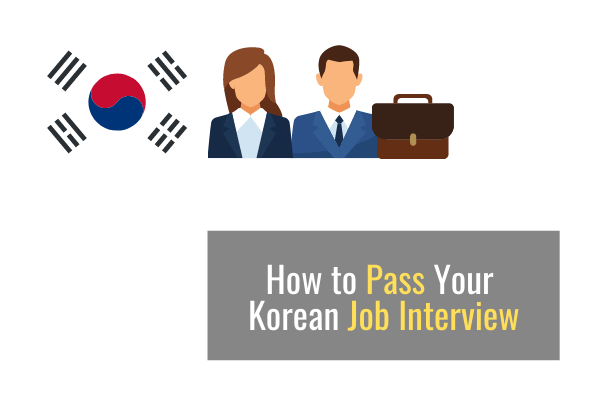This step-by-step guide shows you how to ace your job interview at a Korean company. It includes frequently used questions and answers along with a self-introduction template.
We’ll cover:
- Essential tips for video and in-person interviews
- How to make a good impression
- What to avoid
I worked as an overseas recruiter in South Korea for five years.

Essential Tips for Interviewing in South Korea
Here are a few ways to increase your chances of success:
- Be on time – set a positive tone for the interview
- Make a good first impression – pay attention to dressing and grooming well
- Don’t talk about money at first – this can be addressed after the interview
- Be confident, but not arrogant – Koreans want to see that you’ll fit in
- Keep their needs in mind – for English academies, they need responsible and people-oriented teachers
- Enjoy the process – don’t get too stressed because there are many positions for expats
- Stay positive – don’t complain about previous jobs, bosses or coworkers
Good work getting an interview for a job overseas! You’ve joined an exclusive club of adventurers.
Luckily, interviewing for your first job in Korea is easy. Most of the same rules in your home country apply with a few differences we’ll cover.
A Korean job interview can be simple (English academies) or elaborate (Korean companies) depending on where you’re applying.
Interview Process for English Teacher Position in South Korea
This is a general flow of what to expect in an English teacher interview. You’re not expected to speak Korean, but saying “hello (안녕하세요 or Annyeonghaseyo)” will help.
There’s usually just one interview for English teacher positions. Larger academies will have more questions or rounds.
- You’ll interview over the phone or with video call software like Skype overseas. Dress accordingly and be on-time.
- Self questions – Introductions/introduce yourself/describe yourself
- Why questions – Why Korea? Why teaching?
- Random questions – Your teaching philosophy? What you do in your free time? How you deal with stress? A problem you overcame?
- Open for questions (you are expected to ask questions) – Do you provide the curriculum? What is the dress code? What disciplinary measures do you have? What is a teaching hour defined as?
- Logistical questions – When are you available to come to Korea? When can you start?
Interview Process for Company Jobs in South Korea
Here’s what to expect in a Korean company interview. You might be asked to speak Korean depending on your duties.
A typical interview for Koreans can last 3-5 rounds. You’ll most likely have fewer, so we included the most common ones. Larger companies will have more questions or steps.
- You’ll interview over the phone or with video call software like Skype overseas, or in person if you’re in Korea. Suit up and be on-time.
- Self-introduction (you’ll want to prepare a self-introduction in English and Korean if required) – Introduce yourself. What are your strengths/weaknesses? Describe yourself. What is your ambition/career goal?
- Group interview (depends on the position and number of applicants)
- Why questions – Why did you apply to our company? Why Korea? Why this position?
- Company questions – What do you know about our company? What is our company vision/philosophy?
- Current events – What’s your take on ___ issue?
- Random questions – What is your hobby? How you deal with stress? Tell me about a problem you overcame?
- Presentation (depends on the position)
- Personal questions – Are you in a relationship? Do you have children? Do you like drinking? How was your childhood?
- Open for questions (you are expected to ask questions) – How long is the training period (should be three months)? What is a typical day like working here? What are the performance expectations in the first year?
- Logistical questions – When are you available to come to Korea? When can you start?
The best way to interview for a job in Korea is to not have to. Coveted jobs like university positions are rarely advertised and often found through networking. That’s why it’s so important to build relationships in Korea.

What it’s Like Interviewing for a Job in Korea
Not counting auditions, I only interviewed for one job in Korea. Like I mentioned before, good jobs are rarely advertised.
My first job interview was over the phone in 2006 before I came to the country. It was a simple affair consisting of the following questions:
- Why do you want to come to Korea?
- What are your hobbies?
- When can you come?
I was then passed to their resident foreigner who seemed just as surprised as I was to be speaking to me. He made simple small talk to make sure I sounded OK and not too weird, and that was that.
In hindsight, this was a major red flag that the company wasn’t the best place to work.
I networked my way out of there in a few months and ended up at an overseas recruiter mainly for cabin crew. In the five years I worked there, I helped interview thousands of candidates for airlines. I became familiar with Korean interviews and how to pass them.
More about living in South Korea as an Expat
Read on to find out how to interview according to your job type.
How to Interview for an English Teacher Position/First Job in Korea
At this point, you’ve narrowed down where you want to live and who you want to teach. The next steps apply to most English teaching positions. They also work for most phone/Skype interview situations.
Step 1. Have your “why” ready
They will likely ask, “why do you want to come to Korea?”. Your reason is likely to travel, meet people or shake things up in life.
What you need to say is either:
“I want to learn more about Korean culture (K-pop, K-dramas, history, language, etc.)”
or if you’ll be teaching children
“I really like children and want to help them learn English”
or if you’re feeling brave
“I want to teach English and learn Korean to help bridge the gap between Korea and the world”
Having this down will give you confidence and set the tone for the rest of the questions.
Remembering why you want to live in Korea can also keep you centered on tough days.
Step 2. Prepare your interview room
Set up your camera and mic a few days before your interview in a place with no distractions.
Do a test call with a friend. Make sure you can hear them and vice versa. Record some interview answers using your equipment to see how you look and sound.
There might be a delay when interviewing with someone overseas, so be prepared to wait a second after they finish talking before speaking.
Step 3. Get dressed
Next, you’ll apply for your first job while in your home country.
In that case, you’ll have a phone or Skype interview.
Either way, you can wear your most comfortable pajama bottoms.
If you’re going to be visible, make sure your top half is presentable. Appearances are very important in Korea. As a rule of thumb, always lean towards conservative attire.
For men,
Face: Clean shaven without any piercings and visible tattoos if possible.
Clothes: A button up shirt and tie are guaranteed to make an impression.
Hair: Wash your hair and tie it up if it’s long. Clean cut is a safe choice.
For women,
Face: Minimal makeup and use a light BB cream or foundation.
Clothes: A nice blouse and subtle accessories.
Hair: Wash your hair and tie up long hair. It’s a good idea to not have any vibrant colors as well.
Step 4. Be someone you’d work with
Think of your ideal coworker. Someone fun but reliable. A person you’d be comfortable on a road trip with. Now channel that person.
- Smile
- Make soft eye contact with the camera, not the screen
- Sit up straight
- Don’t move around or fidget too much
- Listen carefully
- Project your voice and speak clearly
Let your roommates know what time to be quiet and remove any distractions including children and pets while silencing phone alerts.
Make sure all your devices are charged for the interview.
Above all, try to be ready 10 minutes early for the call. This sends the message that you’re a professional.
It also doesn’t hurt to have your resume out so you can get an idea of what they might ask.
Step 5. Answer the questions
Be sure to listen carefully and answer questions clearly. If you aren’t sure about a question, ask them to repeat it.
Here are some questions you can expect during an interview for an English teacher position:
Personal questions
- How would you describe yourself?
- What do you like to do in your free time?
- How do you deal with stress?
- Tell me about some of your characteristics that will make you a good teacher?
Questions about Korea
- What do you know about Korea?
- Why do you want to come to Korea?
- Do you speak any Korean?
Negative questions
- Tell me about a mistake you made and what you learned/how you fixed it?
- Tell me about a difficulty you overcame?
English teaching questions
- What is your goal as a teacher?
- Tell me about your skills and capabilities in teaching?
- What is your teaching style?
- If you weren’t planning on teaching abroad, would you still be pursuing a teaching career? Why or why not?
- Since you don’t have a BA in education, how do you think your major will help you teach?
- Do you have any classroom experience?
- What was the hardest thing you overcame in the classroom?
- What do you enjoy most about teaching?
- If you had extra time after finishing a lesson, what would you do with it?
Step 6. Ask them questions
It’s a good idea to show interest in their school or academy. Here are some questions you can ask:
Work questions
- What kind of training do you provide?
- Do you provide curriculum? What other materials do you provide for teachers? What would I be expected to prepare before class?
- What’s the dress code?
- Are there any disciplinary regulations I should know?
- What would I need to do to add something to a lesson? Who would approve it?
- What do you define a teaching hour as?
“If I’m hired” questions
- If I’m chosen, may I see my housing or know the street address beforehand?
- What are actual work hours a day/week?
- Do I get basic benefits such as housing/housing allowance, flight ticket, vacation, 4 major public insurances, etc.? (If not explained in advance)
You may want to pick the most important questions among the last group so you don’t sound too demanding. Mix in a work-related question for every “if I’m hired” question.
Step 7. End on a high note
If all goes well, they’ll ask you some logistical questions about when you can start and come to Korea. This can either mean they’re interested or they need teachers desperately.
Thank them for their time and be prepared to follow up in a few days if you want the job.

How to Interview for a Job at a Korean Company in Person
This part is for expats already in Korea. It can also apply to English academy interviews.
Depending on your skillset, it can take a while to find a job that doesn’t involve teaching English. You might want to interview while working at your current job.
Step 1. Self-introduction (자기소개)
Korean style interviews tend to begin with a “self introduction” that includes your name, age, hometown, major and parents’ occupation.
It can go like this:
Basic self-introduction template
안녕하세요 (Annyeonghaseyo), my name is ____. I’m ____ years old and I’m from ______ country. I majored in _____, but I really want to build a career in ____. In my free time I enjoy ____.
Advanced self-introduction template (Korean company style)
Hello, my name is ___ applying for ____ position at ___ company. I have 2 strengths: ___ and ____.
First, I have a strong _____. /reason/ Second, I am ____. /supporting example/
Thank you.
안녕하십니까. ___사 ___에 지원한 ___입니다. ___에 지원한 저에게는 2가지 장점이 있습니다. ___과 ___입니다.
첫 번째, 저는 ___이 강합니다. /이유/ 두 번째, 저는 ___합니다. /이유/
감사합니다.
You might be asked for a “self-introduction” multiple times in different interview rounds for the same job.
Getting this down is half the battle.
Step 2. Have your “How I like Korea” ready
You’ll probably be asked, “how do you like Korea?”. You might have discovered that it’s a combination of things you love and things you dislike.
The short answer is, “a lot”.
You can also say:
“I really enjoy the (food, historical buildings, things to do, etc.)”
If you choose “food”, elaborate on what you like about it so you sound sincere. For example, it’s “healthy”, “inexpensive”, “has a lot of variety”, etc.
Be prepared to answer, “what do you dislike about Korea?”.
It’s a good idea to find something minor and present it as positively as you can.
For example, “rush hour in Seoul can be hectic, so I wake up early to avoid it.”.
These will cover a lot of ground in the interview and set a positive tone.
Step 3. Do your homework
You’ll be contacted by the HR team regarding your interview date and time.
Find out some basic information about the company including:
- What you admire about it
- What they specialize in
- What their philosophy/mission/vision is
- What you can contribute
These are very important during the interview.
Step 4. Get dressed
Since you’re going to interview in person, you’ll want a nice outfit.
Appearances are very important in Korea. As a rule of thumb, always dress more conservatively.
For men,
Face: Clean shaven without any piercings and visible tattoos if possible.
Clothes: A button up shirt and tie is guaranteed to make an impression. Slacks and dress shoes will be a good idea. Wearing a watch is also good form.
Hair: Wash your hair and style it conservatively. Clean cut is a safe choice.
For women,
Face: Natural makeup such as a light BB cream or foundation.
Clothes: A nice blouse with minimal accessories. Dress pants or below the knee skirt. Black or beige flats or high heels will work.
Hair: Wash your hair and tie up long hair. It’s a good idea to keep your color natural as well.
Step 5. Be someone you’d work with
Think of who you’d hire if you owned a company. Someone professional and easy to work with. Now channel that person.
- Smile naturally
- Make soft eye contact equally with interviewers
- Sit up straight
- Don’t move around or fidget too much
- Listen carefully
- Project your voice and speak clearly
- Don’t dominate conversations with other interviewees or interviewers
Above all, try to be ready 10 minutes early to the interview. This sends the message that you’re a professional.
Step 6. Group interview
Depending on the position, you might start with a group interview or presentation. Harmonious leadership is what they’ll be looking for.
What westerners might consider assertive or confident, Koreans will view as stubborn or domineering. Take the ideal amount in your home country and dial it down 30%.
Some possible questions in a group interview are:
- Please introduce yourself stating your name, age, nationality, academic background (self-introduction).
- Please explain why you want to work at this company.
- If any, please describe your experience citing projects, duration, your approach, etc.
- Please describe your skills and capabilities in this field.
- Please describe your personality and why it will help you become a good employee.
You might be asked to give a presentation. This is to gauge your confidence and communication skills.
Step 7. Answer the questions
Be sure to listen carefully and answer questions clearly. If you aren’t sure about a question, ask them to repeat it.
There’s a Korean expression that goes, “asking at the east gate and answering at the west gate (동문서답)”, which means answering the wrong question. It’s better to make sure you’re answering what they asked.
Here are some questions you can expect during an interview for a company job:
Personal questions
- How would you describe yourself?
- What do you like to do in your free time?
- How do you manage stress?
- Tell me about some of your characteristics that will make you a good employee?
- What are your strengths/weaknesses?
- Why should we hire you?
- What’s your career goal/ambition after joining the company? (입사 후 포부)
Questions about Korea
- How do you like Korea?
- What do you know about Korea?
- Why did you want to come to Korea?
- Do you speak any Korean?
Negative questions
- Tell me about a mistake you made and what you learned/how you fixed it?
- Tell me about a difficulty you overcame?
- Tell me about one of your failures and what you learned?
- How do you resolve conflict with a coworker?
Work questions
- Tell me about your skills and capabilities in this field?
- What do you know about our company?
- Since you don’t have a BA in this field, how do you think your major will help you?
- Do you have any relevant experience?
- What do you enjoy most about this field?
- If you had downtime after finishing your tasks, what would you do with it?
Step 8. Ask them questions
It’s a good idea to show interest in their company. Here are some safe questions you can ask:
Work questions
- How long is the training period (should be three months)?
- What are the performance expectations in the first year?
- What is a typical day like at this company?
Step 9. Handle random questions
Random Personal Questions
Near the end of the interview, you might be asked some questions that might be considered inappropriate in your country.
This is usually done by your potential supervisor. Don’t be alarmed and know that this is common. They’d like to know you on a deeper level before working with you and are pressed for time.
You might hear:
- Are you in a relationship?
- Are you married?
- Do you have children?
- Do you like Korean men/women?
- How often do you drink?
- How much can you drink?
- How does it feel to live far away from your parents?
- How long do you plan on working here?
- What will you do if you get married? (asked to women usually)
Step 10. End on a high note
If all goes well, they’ll ask you some logistical questions about when you can start and what kind of salary you want. This can either mean they’re interested or they need the position filled desperately.
Thank them for their time and be prepared to follow up in a few days if you’re interested in the job.
You’ll then be expected to provide a medical examination report, and attend orientation.
FAQ
Do I need to speak Korean to pass an interview for a Korean company?
Not for an English teacher position. Many company jobs like international marketer don’t require fluent Korean, although it helps. Many people work at Korean companies with a conversational level of the language because their co-workers speak English and others can practice.
When is the best time to interview for a Korean job?
The hiring season is usually Spring and early Summer, but many companies hire year-round.
Who conducts a Korean job interview?
It depends on the size and resources of the company. For small English academies, the owner will often conduct the interview. They’ll often enlist the help of a current English teacher, so be prepared to speak with at least two people. For larger conglomerates, you can expect two or more including HR staff and the manager who will be supervising you.
How are Korean interviews conducted?
They’ll be done over the phone or video conference software like Skype if you’re in your home country. You’ll interview in person if you are in Korea with a few people. There also might be a group interview or presentation during multiple rounds.
What should I avoid during a Korean interview?
These are some common mistakes when interviewing for a job in Korea:
- Talking about money
- Complaining or criticizing
- Being low energy
- Being uninterested in the company or country
- Dominating the conversation
What are Koreans looking for in an English teacher?
Above all they want:
- Clean cut and clean appearance (attractiveness is not as important as these)
- Positive attitude towards work
- Reliable attendance and punctuality
- Someone who doesn’t cause trouble or bad mouth the school, students, teachers and owners
Did we miss anything?
Interviewing for a job in South Korea is an exciting step towards living abroad.
Let us know your interview tips in the comments below!




hi name is kazumi I’m13 years old taong gulag at ako ay mula sa pilipinas County. Nag – major ako sa pilipinas ngunit talagang nais Kong bumuo ng Isang karera sa Korea sa aking libreng oras na nasisiyahan ako
Hi Kazumi,
That’s great! It’s never too early to start preparing. Studying Korean will be a big help.
I’m wondering if it’s normal for foreigners, including teachers, to negotiate salary? In the US, most places expect you to do this…is it common in Korea? Is it ok to negotiate?
Hi H K,
For Koreans, college grads or people working for government or public institutions usually receive salary according to internal pay systems and don’t negotiate.
It’s common for Koreans with work experience to negotiate salary at a 5-10% increase.
It’s okay for an expat to negotiate though. This can depend on how badly they need someone and how much experience you have among other things. Best of luck!